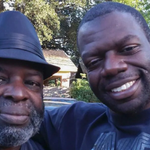
A Virginia jury has spared the life of Iraq war veteran Ronald Hamilton (pictured, right, with his father) in the 2016 killings of his wife and a rookie police officer. The jury split 6 – 6 on whether to impose the death penalty for Hamilton’s murder of his wife, Crystal Hamilton, but unanimously agreed to impose a life sentence for the death of Officer Ashley Guindon, who was killed while she responded to Crystal Hamilton’s 911 call. Under Virginia law, the court must impose a life sentence if any of the jurors vote for life. At the sentencing phase of the trial, Hamilton’s lawyers presented evidence of his possible posttraumatic stress disorder from two tours of duty in Iraq, emphasized his development into a model soldier who, as an Army sergeant, saved a colleague’s life while they were under mortar fire, and presented testimony from his father, Ronald W. Hamilton, and other family members. During his testimony, the elder Ronald Hamilton — a retired police officer whose career included service at the White House and who served as the second-in-command of the Charleston, South Carolina police force — expressed his sympathy to the family of Officer Guindon and to the two other officers who were wounded. “I see the prosecutor’s side and defense side, and I can sit on either side. I feel the pain. I understand the duty,” Hamilton testified. “If anyone in this courtroom had their relative sitting where my son was, they’d be asking for mercy,” he said. As is often the case in capital trials of war veterans, the prosecution had attempted to convert Hamilton’s military service into an aggravating factor, repeatedly referring to him as “depraved” and “dangerous.” Prosecutor Richard Conway told the jury that soldiers “deserve respect and deserve protection, but they don’t get a pass for capital murder,” while his co-counsel, Matthew Lowery urged the jury to “[p]ut him in the grave because that’s what he deserves.”
No Virginia jury has imposed a death sentence since 2011 and Hamilton had offered to plead guilty in exchange for a sentence of life without parole. However, Prince William County Commonwealth’s Attorney Paul Ebert – known for his frequent use of the death penalty – rejected the offer. The county is responsible for more executions since 1976 than any other county in the Commonwealth and is among the 2% of counties that account for a majority of all executions in the United States in that period.
(Ian Shapira, Va. jury deadlocks on death sentence for man who killed wife and police officer, The Washington Post, October 25, 2018; Emily Sides, Jury deadlocked on death penalty, Hamilton sentenced to life in double murder, InsideNoVA, October 25, 2018; Matthew Barakat, Jury spares life of soldier convicted of killing wife, rookie police officer, Associated Press, October 25, 2018; Matthew Barakat, Life-or-death decision faces jury in cop killer case, Associated Press, October 23, 2018; Ian Shapira, For Va. man who killed his wife and a police officer, a push for death and plea for mercy, The Washington Post, October 1, 2018; Ian Shapira, Retired police commander tries to save his son — a cop killer — from execution, The Washington Post, October 17, 2018.) See Sentencing.
Sentencing Data
Sep 13, 2023

When Jurors Do Not Agree, Should a Death Sentence Be Imposed?
Military
Aug 22, 2023

